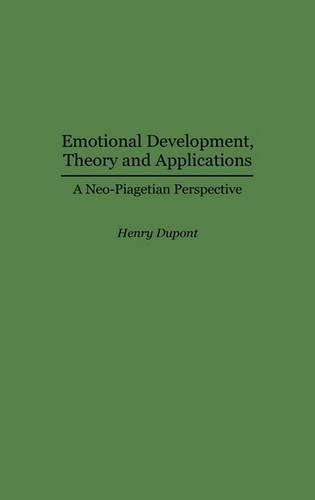
Emotional Development, Theory and Applications: A Neo-Piagetian Perspective
(Hardback)
Publishing Details
Emotional Development, Theory and Applications: A Neo-Piagetian Perspective
By (Author) Henry Dupont
Bloomsbury Publishing PLC
Praeger Publishers Inc
24th May 1994
United States
Classifications
Tertiary Education
Non Fiction
Cognition and cognitive psychology
Psychotherapy: child and adolescent
155.4124
Physical Properties
Hardback
152
Description
Freud's assumption that our emotions are instinctual and innate, and that they reside in our unconscious, is still the dominant notion in our conventional wisdom. If our emotions are instinctual and innate, then they have little relationship to our needs and values, and they do not change in the course of development. This book advances a contemporary theory of emotional development, a neo-Piagetian theory that postulates that both our feelings and emotions are cognitive constructions that are informed by our needs and values, and that our feelings and emotions change considerably in the course of development. Using interview and original case material, the author illustrates his theory's application to both short- and long-term psychotherapy, as well as the implications for research, assessment, emotional education, and counseling.
Reviews
"(Dr. Dupont) outlines methods for studying the relations between a child's social circumstances and its emotional behavior, methods that may provide just the key we need to some of our currently most pressing problems: not just to do with the development of a more effective early emotional education, but with how we might help children in trauma, or avert juvenile violence. This is an important book for practitioners and theorists alike."-John Shotter Professor, University of New Hampshire
"Henry Dupont's many years as an educator and clinical psychologist interested in Piaget's constructionist theory has resulted in the first major effort to construct a view of emotional development and affectivity within this framework. Dupont does this very well and with accuracy, and his book is certain to spark considerable rethinking of Piaget's theory and its descendants, and of emotional development."-Barry S. Wadsworth Professor, Mount Holyoke College
"This book by Dr. Dupont provided me with important new insights into the emotional development of the children with whom I work. This well-researched work is "must" reading for anyone interested in furthering the emotional development of people who they counsel or teach."-Gloria LoCiero LPC, NBCC Counselor with a Specialty in Education Middle School Counselor in Newton County Public Schools
The cognitive approach to development in adults is familiar, but this is the first clear outline of this developmental perspective that an undergraduate might be able to follow. Dupont offers a clear and concise constructivist theory of emotional development. Upper-division undergraduate through professional.-Choice
"The cognitive approach to development in adults is familiar, but this is the first clear outline of this developmental perspective that an undergraduate might be able to follow. Dupont offers a clear and concise constructivist theory of emotional development. Upper-division undergraduate through professional."-Choice
Author Bio
HENRY DUPONT, a licensed clinical psychologist in Blairsville, Georgia, has taught at the University of Wisconsin-Eau Claire and at the Univerity of Hawaii. He has had extensive experience as an author, educator, and psychotherapist for both children and adults, with a lifelong interest in emotional development. He is the author of Assessing Emotional Development (1982), the senior author of Transition: A Curriculum Program to Help Students Through the Difficult Passage from Childhood to Middle Adolescence (1979) and Toward Affective Development (1974) and the editor of Educating Emotionally Disturbed Children (1974, 1969).
